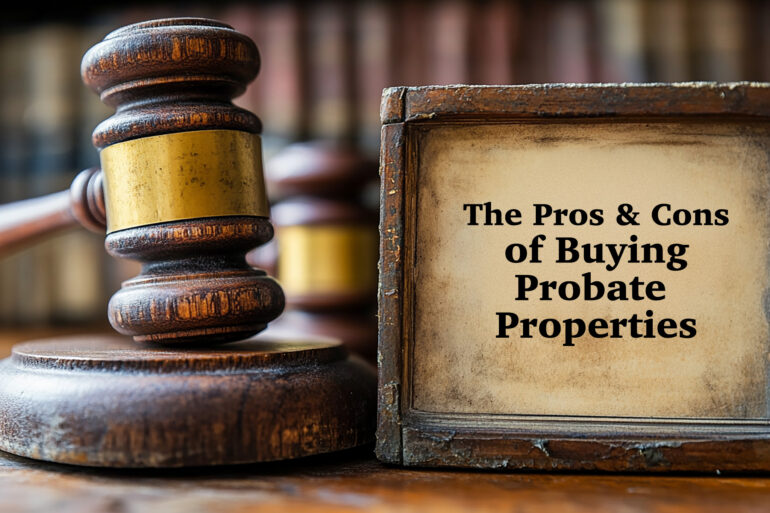The Pros and Cons of Buying Probate Properties
You can’t take it with you. None of us knows for certain what happens after death, but on this side of the veil, we become an estate. Some people put their affairs in order well in advance of their demise. Others never get around to writing a will naming beneficiaries or creating a revocable living trust that avoids the probate process. A lack of basic estate planning is frequently the reason probate properties exist.
Is buying a probate property worth it? As with any real estate endeavor, the answer depends on the individual situation. Learn the pros and cons of buying probate properties before deciding whether to take the risk.
What is a Probate Property?
Probate is the court process by which a deceased person’s assets are distributed to their beneficiaries. The probate process varies by state.
The biggest pro concerning purchasing probate properties is that you are likely to save money.
In general, the personal representative of an estate is in charge of distributing the deceased’s assets as per the terms of their will. If the person died intestate, or without a will, a personal representative is appointed by the court. The assets are divided as per the state’s law of intestate succession based on marital and kinship ties. The personal representative must also identify any creditors of the deceased.
In some cases, properties enter probate because the owner died and left debts that require satisfying via the property sale. In Florida, the estate’s creditors cannot take homestead properties, the home in which the late owner lived as their primary residence. The deceased can leave their homes to their spouses, children, or descendants without creditors seizing the property. That is not the situation in many states.
Find out how probate is conducted in the state in which the property is located before considering buying such properties.
Probate Property Marketing
While the probate court oversees the probate process, probate properties are generally marketed by real estate agents in the same way as other properties. The personal representative is in charge of hiring the real estate agent.
Probate vs. Estate Sale
While the two share some common elements, probate sales are not the same as estate sales. The latter does not always refer to property on the market due to the owner’s death. Divorce, foreclosure, and the owner relocating to a nursing home or assisted-living facility may also prompt an estate sale.
Estate sales typically involve the sale of a property to settle the estate and divide the proceeds among the beneficiaries. Heirs may want to unload unwanted real estate as soon as possible because insurance, maintenance, taxes, and other costs drain assets from the estate.
If the late owner put the house into a revocable living trust — which becomes irrevocable upon their death — the property does not go through probate and can be put on the market by the personal representative. No court is involved.
Estate auctions, conducted by professional auctioneers, involve a simpler and more straightforward process than sales. If you are seeking a quick purchase, an estate auction makes more sense than a probate sale.
Finding Probate Properties
Because Florida is home to many older people, it may be easier to find a probate property there than in some other locales. Look for a real estate agent specializing in probate properties. You want someone with expertise in handling these types of sales.
Some agents may advise against purchasing probate properties, but that is often because they are not clear on the rules. Not understanding the rules can cause serious difficulties in purchasing probate properties.
Other ways to find probate properties include monitoring court probate filings, looking for online listings, scouring estate auction sites, and conducting an email or phone campaign. Network with estate attorneys for information on available or upcoming properties.
Familiarize yourself with the state probate code and its regulations.
Keep in mind that the probate court oversees the sale from start to finish.
Probate Property Pros
The biggest pro concerning purchasing probate properties is that you are likely to save money. These properties can prove a good way to get started in real estate investing. If you have the patience and conduct your due diligence, you can get a good deal. The court is in charge of obtaining the highest price for the property, but because of the less-than-stellar condition of many of these homes, the accepted offer is usually below market value.
Another plus is that there is less competition for probate properties compared to traditional properties. Fewer buyers are familiar with the probate system and do not want to venture into the more complicated nature of probate property purchases.
Probate properties often provide good “fix and flip” opportunities.
If you are handy, probate properties offer a good opportunity to buy a fixer-upper and make it marketable.
Probate Property Cons
Patience is necessary when pursuing a probate sale. The process can take much longer than standard real estate transactions. While an ordinary real estate transaction takes about two months, it can take a year or more to complete a probate sale due to court involvement as well as family issues and debt settlement.
Keep in mind that the probate court oversees the sale from start to finish. In some states, the court must confirm any agreements between the buyer and seller. A confirmation hearing is held for this purpose, and the buyer must appear. During this hearing, other buyers may make higher bids than the one accepted, much like an auction. Confirmation hearings are not necessary in many states.
Probate properties are almost always sold “as is.” While a potential buyer can arrange a home inspection, they cannot negotiate for any changes to the home. In many cases, these properties are going to require a lot of work and repairs. While not all probate properties were home to elderly people or those in poor health, that is the situation for many of them. The home may have been neglected and lacked regular maintenance.
One major con of probate property is that the buyer may not realize the extent of the work needed until the purchase is complete. They may realize too late that the property rehabilitation will require more money, time, and effort than anticipated. That is why a walkthrough and inspection prior to purchase is an absolute necessity.
However, if you are handy, probate properties offer a good opportunity to buy a fixer-upper and make it marketable. Of course, you can always make an offer on a probate property based on the value after professional repair.








